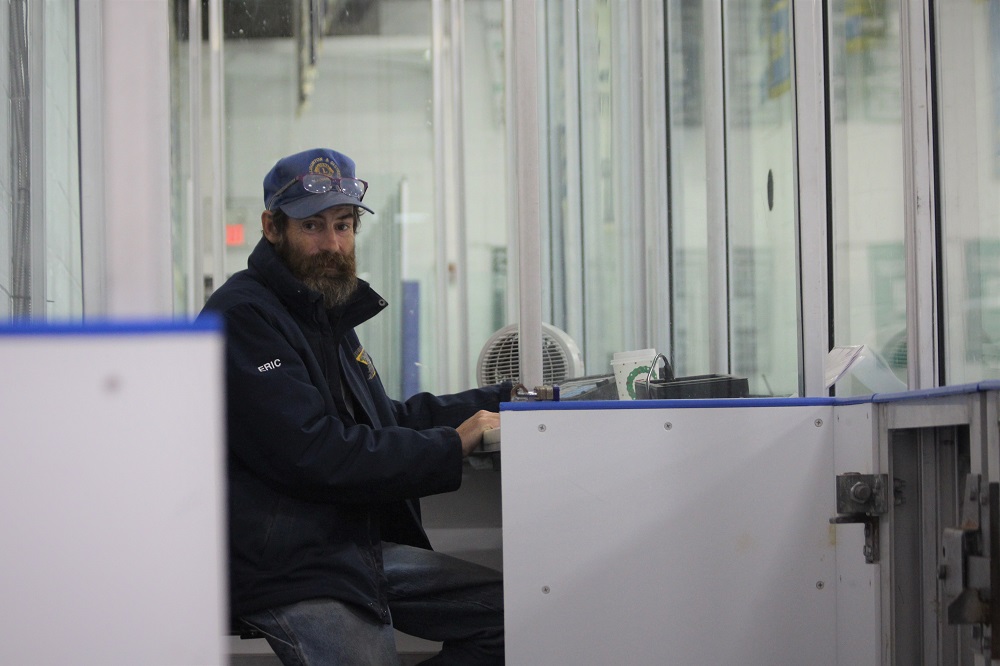While the freezing rain fell outside, Highland Storm action was heating up the Minden arena recently
The score kept ticking up for the home side as blue and yellow jerseys surged up the ice to the cheers of friends and family in the stands.
But without a bearded man in a blue Storm jacket overlooking the red line, the crowd, players or referees wouldn’t know much about the game at all.
Eric Nicholls has been a hockey timekeeper for 40 years. He’s watched the clock and penalty box as future stars stickhandled down the rink, kids played their hearts out for the Silver Stick championship, and a feisty rivalry ebbed and flowed between Minden and Haliburton.
On March 15, he’ll deliver his last game report.
“I think it’s time for me to step down and let somebody else take over,” said Nicholls, standing beside the rink at the Haliburton arena.
He points over to the timekeeping box beneath the barn’s dark brown rafters. That’s the spot he began his timekeeping career at age 18 in 1982.
His friend, Luke Schell, asked him if he’d consider timekeeping for the men’s league.
“Then it went from there,” Nicholls said. “I was overwhelmed at the beginning, but after a while, it became second nature.”
Nicholls would arrive about an hour before each game. Until a recent switch to digital timekeeping, he would collect the game sheets from the coaches. During the games, he watches the play to catch each whistle and penalty before deftly dialing in the time on the clock. After the buzzer, he gets referees to sign the timesheet before sending the vital information to the Ontario Minor Hockey League (OMHA).
The game’s location matters to timekeepers, since the clocks at each arena function differently
The Haliburton Arena has had three clocks since Nicholls started.
He taught his tricks of the trade to others throughout the years too.
“I remember the first night that we were sitting in the box together,” said fellow timekeeper Diane Peacock, who Nicholls trained nine years ago. “I think about the fact of what he taught me and how he’s mentored me over the years.”
When the Minden arena was being rebuilt, Nicholls shared his home turf, Haliburton, with Peacock. “He said ‘don’t worry, you’re not going to be without a job, we’ll just split everything up.’ And he taught me how to use Haliburton’s clock and made me feel comfortable there.”
Community kudos
“The greatest compliment I can pay him is when I call out-of-town referees to see if they can come help us out, they almost always ask me, ‘is Eric doing the clock’?” said OMHA referee-in-chief Brad Tate. He was speaking to a crowd gathered to honour Nicholls’ career after a Highland Storm game. “If I say yes, they say yes,” Tate said.
Former Dysart et al mayor Andrea Roberts thanked Nicholls for his dedication to minor hockey and his contribution to the town.
“It really is something you should be so proud of,” she said.
Nicholls was also presented with a plaque from OMHA region 5 director Andy Cooke, and his own “Nicholls” Highland Storm jersey.
The timekeeper said he appreciated the recognition. “But I’d rather be a person behind the scenes.”
Time for change
His number one tip for a new timekeeper?
“Just relax, enjoy it, and if you make a mistake, call the referees over. The referees will help you out,” he said.
Peacock said there will be lots of support for new volunteers. “Once you get onto it, it’s just a matter of hitting the right buttons,” she said.
Many newcomers start out keeping time for younger age groups that often get fewer penalties.
“Everybody thinks it’s a daunting task, but I caught on to it fairly fast,” Peacock said.
For volunteers such as Peacock or Nicholls, it’s also meant joining the Highland Storm community.
Nicholls said he’ll still come out to games to see old friends and cheer on the Storm.
“It’s a really tight-knit community,” he said.
Back at the Minden arena, the Storm put the finishing touches on a 7-1 victory. The buzzer sounded and the teams scrambled off the ice. But the arena wasn’t ready for the next game until Nicholls reset the clock.





